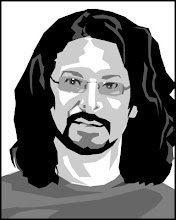The experience was transforming. I did change. I felt it in my body. It was not the kilt. Kilts may have magic; I'll have more to say about this later. But I am not depressed anymore. I am again joy.
As directed, I went to play with the band--the Rhizomatics. Two of us were available (Tom's son played bass and drums for a while but had to go to work), so dug and I set up some prerecorded loops in Abelton's Live. We played and recorded over these tracks. At certain moments we hit that magic that improvisation makes possible. dug played the best solo I have ever heard him perform, and I listened, really listened, and picked notes with effects (I love echoes more than anything else; read my book on music video [shameless advertisement]).
After an hour or so, like in deep meditation, we were in tune. This is an important moment in the musical experience of communication; is the band actually in tune with each other? When we hit that moment, my body responded. I stood up straight and tall. I could feel myself growing and receiving from the sounds the power and force (I have read so much on these metaphors that, like many educated people, I feel like I know less and not more. So, I will use force, like "the force" of jedi lore (so I'm a geek, deal with it) and Power to refer to discourse. If you do read my older blogs you may see that this use is not consistent; will you, reader, bother reading on with this thought flowing from my fingers, edited by my mind, and sent to the world by the web? I hope I do not bore you with these details that I believe scholarship deserves--even in a blog).
Kilted. Red and black tartan with red t-shirt and black sweater--at least I think that's what I wore. It was an entire day ago. But when the music swelled I felt again that masculinity that I have only felt when kilted. At some time I will blog about my recollections of early experiences, but know here that the clothes make a difference. They do make the man.
So, do the clothes make the man? Like many hackneyed phrases, this is weak. However, when the music lifted me from this depression (I have had some moments of relief in the past two weeks), I found that re-adopting my preferred dress (well, really a skirt; that's a joke) allowed the moment to rise, the body to rise with a connection to the force in which bodies and musical expression were tied in musical expression in a circularity that we call communication. This is where Merleau-Ponty seems to have been going with his discussions on art. It is where Vivian Sobchack, Richard Lanigan, and my own work have gone. So many phenomenologies written in the spirit of Merleau-Ponty focus on perception (for indeed his work in this realm is supreme). Algis Mickunas wrote an excellent essay called "The Primacy of Expression" that stood along side Merleau-Ponty's "Primacy of Perception." Even the book I just bought, "Perception and the Phenomenology of Music Experience," by Harris M. Berger, which I am trying to make time to read, focuses his title on perception. I will argue that perception and expression do not have a battle for "primacy," but instead, when seen in an unending circularity, are what we call communication. Indeed, I dedicate my life to this probelmatic.


